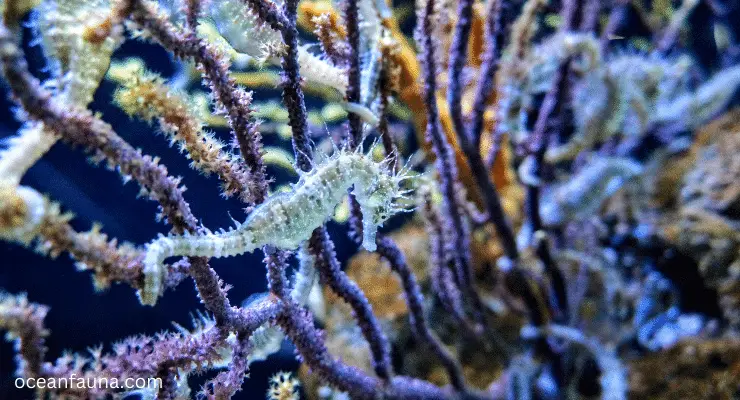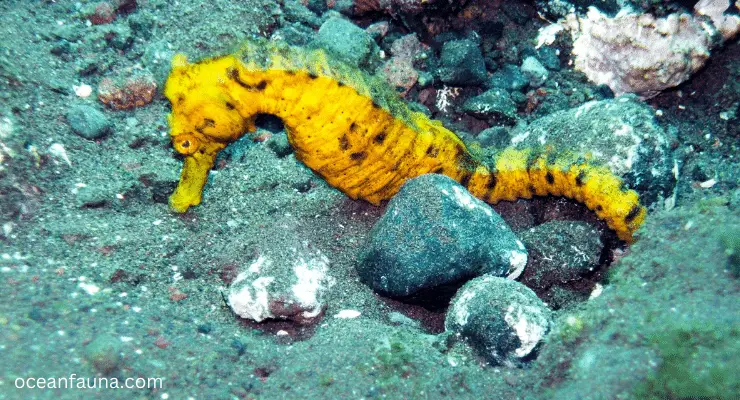Yes, seahorses sleep but not like other ocean creatures. Their sleeping time and technique are different from others.
In this regard, people have so many doubts and misconceptions. Contrary to people’s thought, seahorses can sleep even though they don’t have eyelids.
This blog will explain how this beautiful creature sleeps and other interesting facts about its sleeping behaviour.
Do Seahorses Sleep?
All creatures need to sleep and take naps throughout the day. Seahorses aren’t different from other animals when it comes to sleeping habits. But the difference is in their sleeping style and schedule.
Their biological anatomy is a factor in their sleeping behaviour. For example, seahorses have no eyelids. Because of this fact, people think seahorses can’t sleep, which is wrong.
The truth is the majority of fish species don’t have eyelids because they live in water and don’t need to protect their eyes from drying out. So, seahorses can sleep even without eyelids.
Do Seahorses Sleep with Their Eyes Open?
Seahorses sleep with their eyes open because they have no eyelids, but this doesn’t mean they’re always aware of their surroundings. In fact, many people think seahorses never sleep because of this quirk.

Almost all fish don’t have any eyelids, and they keep their eyes open while sleeping or taking rest. But that doesn’t mean they do not sleep.
Seahorses have a special adaptation that allows them to shut off half of their brain at a time and reduce their movements. This adaptation helps them to become less noticeable by predators while resting or sleeping. So, even though they do not close their eyes, seahorses sleep and rest like other animals.
Are Seahorses Nocturnal or Diurnal?
Due to their reliance on the surrounding environment and daily activities for sustenance, seahorses do not have set sleeping patterns like humans. This means that when it comes time to take a nap, different seahorses will display various sleep behaviours. In other words, no two seahorses are alike when it comes to nap time!
For example, the Satomi pygmy is a nocturnal species that is awake only at night and sleeps throughout the day. Other animals are strictly diurnal, meaning they are up throughout the day and sleep at night.
Also See: Can Seahorses Change Gender?[No-Here’s Why]
Some seahorses, similar to many other fish species, follow a polyphasic sleeping pattern by taking mini naps throughout the day instead of one long sleep at night like humans.
Some seahorses may also doze off during the day and become active at night–or vice versa. We call this “cathemeral” behaviour, where an animal has opposing nocturnal/diurnal sleeping patterns.
How Long Do Seahorses Sleep?
Seahorses do not have set sleeping patterns as humans do, but they do need some time to rest and recharge. The average seahorse takes anywhere from 20 minutes to 2 hours of napping throughout the day.
While they doze off, their bodies slow down, and their movements become limited–but they never completely lose consciousness and can still respond to their surroundings if needed.
Seahorses also do not enter deep sleep. Rather, they go into a state of rest and relaxation where their bodies can recover and rejuvenate for the next day’s activities.
Do Seahorses Sleep Lying Down?
No, seahorses do not sleep lying down as humans do. Instead, they use their tail to grip objects and remain upright while sleeping or resting. This behaviour allows them to blend into their surroundings and also helps protect them from potential predators.

Do Seahorses Ever Feel Tired?
Yes, seahorses become tired very soon. Seahorses are actually quite fragile creatures. Their small size and lack of a backbone make them vulnerable to predators, and their slow swimming speed means that they often tire quickly.
Also See: Do Seahorses Mate for Life?
In addition, seahorses do not have a lot of energy reserves. This means they need to constantly search for food and do not have the luxury of taking long naps or extended rest periods like larger animals do.
When tired, seahorses may seek shelter in seaweed or coral and sometimes even bury themselves in the sand for protection and rest.
FAQs
Do baby seahorses sleep?
Yes, baby seahorses do take naps just like adult seahorses do. They often stay close to their parents for protection during these times and may even doze off while holding onto their parent’s tails.
Can seahorses sleep while swimming?
Seahorses do not swim continuously as some other fish do. However, they can shut off half of their brain at a time and reduce movements while sleeping or resting. This allows them to nap while also remaining upright and swimming slowly in the water.
Do seahorses hibernate?
No, seahorses do not enter a state of hibernation as some other animals do during winter. They are active and continue to search for food all year round. However, they can reduce their movements and conserve energy during colder periods by finding shelter in seaweed or coral.
What is the difference between polyphasic and monophasic sleeping patterns?
Monophasic sleep patterns involve one long period of rest at night, while polyphasic patterns involve multiple shorter periods of sleep throughout the day.
Both patterns have their advantages and disadvantages. Monophasic sleep is easier to maintain on a long-term basis and allows for a longer period of uninterrupted sleep. However, polyphasic sleep can be more effective in terms of overall energy levels and productivity.
Seahorses most commonly follow a polyphasic pattern, taking mini naps throughout the day instead of one long sleep at night as humans do.
Conclusion
Seahorses do sleep, but their lack of eyelids and unique adaptations to blend into their surroundings make it hard for us to see this behaviour.
They also do not have set sleeping patterns or extended rest periods, as they constantly need to search for food and protect themselves from predators. Like humans, seahorses can become tired and require some time to rest and recharge.


2 thoughts on “Do Seahorses Sleep? Secrets Of Seahorse Sleeping Behaviour”